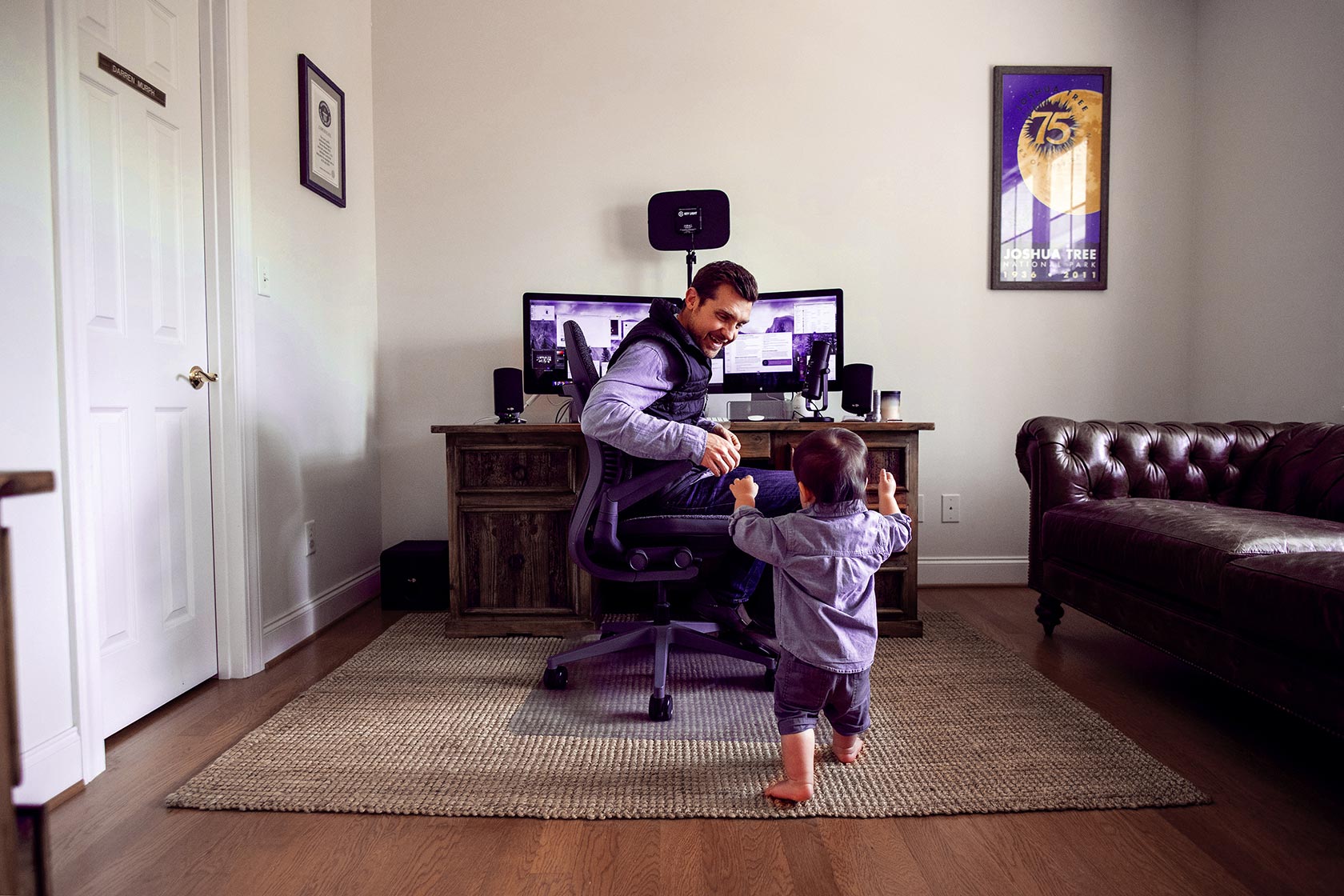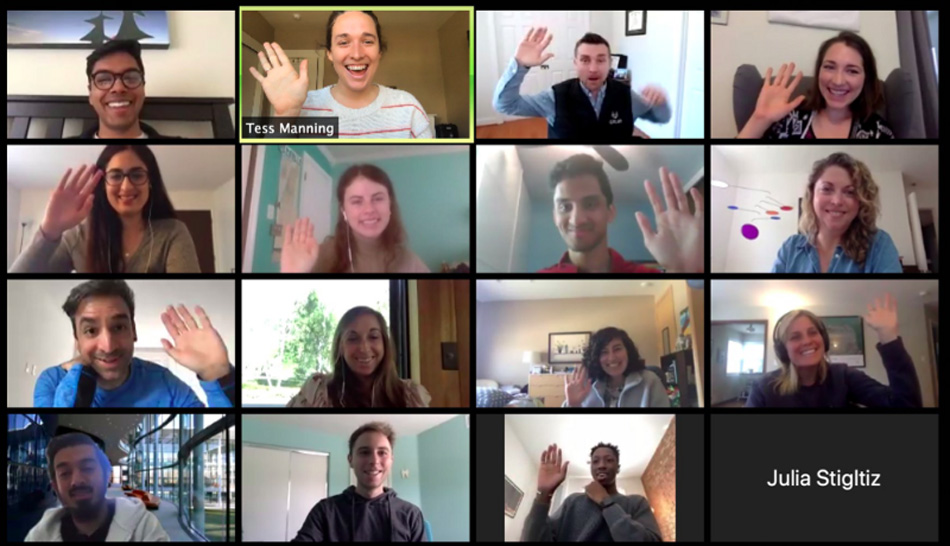
Darren Murph is in charge of all telecommuting at GitLab, the world's largest fully remote company. He is engaged in hiring employees, onboarding them, creating a work culture, maintaining communication within the team (1,300 people!) And much more. Murph is one of the world's foremost proponents of remote work. He has led dozens of remote teams, drew up remote telecommuting schemes for startups and large corporations, worked in all types of remote companies, wrote the popular Remote Playbook guide, and has been working from home for 14 years.
During this strange and difficult time, requiring a reorganization for employees and employers, Darren ran the AMA through Slack. At Rubrain, we have collected and translated the 10 best questions and answers.
Question 1 - trainings
Hi Darren! I am wondering if you have any resources for our HR to make it easier for them to translate their onboarding trainings (especially for new team members) into a remote format?
Darren Murph:
Yes, this is a daunting task for companies accustomed to hiring and targeting new employees face-to-face. The best advice I can give is to have all new employees in the company get an onboarding companion. A person they can contact via Slack or Zoom every day with any question. This gives them one point of contact, so they don't have to think about who to contact, and they don't bother the whole company. Plus - it helps them to quickly join the organization, make friends, start to feel at home. Here's how this concept of onboarding companions is implemented in GitLab: https://about.gitlab.com/handbook/general-onboarding/onboarding-buddies/ .

Question 2 - burnout
What can be done so that people at a distance do not burn out in a few years? It seems to me that this is a big problem, and even during these few months the effect is already being felt. I am afraid that over time, the performance of our programming team could drop dramatically.
Darren Murph:
Thanks for the great question!
If you immediately hire developers who want to work remotely to the team, the problem solves itself. At GitLab, our employee retention rate is over 85% because we are the people who love to work from home come to us.
If your people preferred to work in the office, and now they are forced to conduct business remotely, here a lot depends on managers and leaders. Teams that sit in the same office spontaneously create connections and cultures. In the case of remote work, this must be done on purpose.
- Be sure to create a place for communication. For example, a 24/7 Zoom lobby works well, where people can get together, chat, chat after the day (if they need to), just like in a real office space.
- Think of weekly / monthly games, talent shows, quizzes, general games / music / karaoke sessions. Last week we had a 135+ talent show from six continents, with judges and prizes. It was a lot of fun.
- Create Slack channels for non-working stuff. Good news channel, funny cat dog videos, parent channel, fitness channel and so on. Deliberately create paths for the emergence of discourse within the team.
We have a great GitLab guide on how to create opportunities for informal communication within a team here: https://about.gitlab.com/company/culture/all-remote/informal-communication/
Question 3 - culture
Hi Darren, thanks for answering our questions. How did GitLab grow into a 1300+ employee company and still maintain its culture? Do you have any advice for startups or other firms that are constantly growing and gradually losing their identity?
Darren Murph:
Good question.
In short, document your culture. Document your values. Make a section on the site where everyone can read about them. Values scale infinitely; they do not depend on the size of the company. Culture is not a feeling or an atmosphere. They are universal values, the North Star that is visible from anywhere in the world and helps you guide all business decisions, large or small. See how detail values are paintedfrom GitLab. It's not 5-6 words. These are thousands of words describing in detail how we act in a given situation.

Remote meeting of GitLab executives
Question 4 - vacancies
Darren, I like working remotely, but I have little experience. Is it possible that by the end of 2020 there will be more vacancies for such work due to the coronavirus, and there will also be more vacancies?
Darren Murph:
Guaranteed. The world will never put that genie back in the bottle again. The global spread of remote technologies due to Covid-19 has accelerated by at least 10 years. We jumped forward. All digital companies in the world, even in places where offices are not closed, are now building remote infrastructure. The old myth that “this work cannot be done from home” has been shattered.
I think that from this tragic situation, you can still draw some kind of positive. It will give more opportunities to underdeveloped areas and countries, encourage more people to invest in local communities, and help reverse rural depopulation. Silicon Valley companies will search for programmers around the world and allow them to work from home. More people will associate themselves with their place, with their village or city, and not with their position.
Question 5 - old companies
Do you have any idea why some companies are so opposed to remote work? And even against flexible schedules that allow employees to move quickly from work from home to work in the office?
Darren Murph:
In my experience, the reason for resistance is most often one of these three:
- , , . , , , , HR, . « ». - , , .
- . . , , . . , . «» , .
- . « » 10 , , — , . , Slack Zoom, — , Wi-Fi , . 10 , . , 14 6,5- , 20 . .

6 —
I have more than 7 years of experience as a sysadmin, now I am learning DevOps. But I can't find a job. It turns out that I changed careers, and my previous experience does not count? I really need remote work now.
Darren Murph:
My career is not a straight line either. I have a master's degree in business, I worked as a journalist, PR agent, in communications, developed a strategy for a travel magazine, now I work for GitLab. Previous experience has not been canceled. The main thing is to show your worth in an interview. You are more than a piece of paper. You just need someone at the other end of the table to give you the opportunity to show it.
My advice is to keep learning and be patient. Once I was 6 months without a job, and it felt like it was 100 years. And this is with a large portfolio of remote work! You may need to talk to hundreds of people before 1-2 of these discussions get you anywhere. It is important to have a support group, at least a group of like-minded people, and not lose heart in the search.
Question 7 - cleaning up Slack
I think I read that GitLab erases messages in Slack after a while. Can you explain what is the plus here? At my company, we depend heavily on the Slack story.
Darren Murph:
Yes, we do laundry! To get people to use Slack for its best purpose, informal communication. If nothing is erased, the endless number of unread messages can be detrimental to your psyche and productivity. They interfere with concentration, finding the state of flow. If your life depends on pings on Slack, this is a recipe for burnout.
Therefore, we delete all messages after 90 days. If your team knows this, they will never request a message flow for a project context. Instead, they will be forced to discuss and end the discussion of work where appropriate. People are not meant to have hundreds of discussions at once, some of which started a year ago. Brains start asking for a timeout.
Question 8 - working at GitLab
Hi Darren, three questions:
What is the hardest part of your job as a remote team leader?
How many of your 1,300+ colleagues burn out from telework and isolation (given you have guidance on how to avoid this)?
How many people left GitLab because they wanted to go back to the office? How often do they leave you compared to traditional companies in the industry?
Darren Murph:
- The hardest part is making it clear that people have to give themselves the opportunity to really work differently. At GitLab, people who dump their old work luggage at the door do well and take this opportunity to start thinking differently. But it's hard. All people have past experience that colors all their future work, they believe that "it is necessary", although it is not.
- , , . : https://about.gitlab.com/company/culture/all-remote/mental-health/. Slack, , ( ). — https://about.gitlab.com/handbook/paid-time-off/#monthly-reminder-to-consider-taking-pto. , , .
- 85% , — (81%). , , , .

Question 9 - start of deletion
Hi Darren, can you give some advice to people who are changing careers and want to move to remote work in an IT company? I know several people who find it very difficult, because they “don't have X years of experience”. Their services as programmers are not required, they are not even accepted into junior status, although they attend courses and have skills in other similar industries that could then be used. Any advice would be very helpful, thanks!
Darren Murph :
No doubt it's difficult. Although it gradually gets easier. There is no magical way to get a job straight away. My first remote job was a low-paid freelance job, which I gradually developed and made something of a career out of it. Many workers do not want to start from there, but this is one of the options.
The second option is to take on a similar job and gradually build a portfolio that makes you look presentable. You don't have to work from home right away. It is easier for managers to let a proven employee move to a remote location.
Question 10 - what's in the future
Darren, what has changed the most in your opinion about telecommuting in the last 1-2 years?
Darren Murph:
I used to think that this area will grow slowly, and become a more popular method of digital labor sometime by the time my son (he is now 1 year old) starts looking for work. Now I think this will be the normal and widely accepted way of working for hundreds of millions by 2021.
Changes in the field happen literally every month. We are now witnessing a gigantic social and cultural shift that will be recorded in history textbooks. As powerful as the invention of the conveyor at the beginning of the 20th century. The job will now change forever.